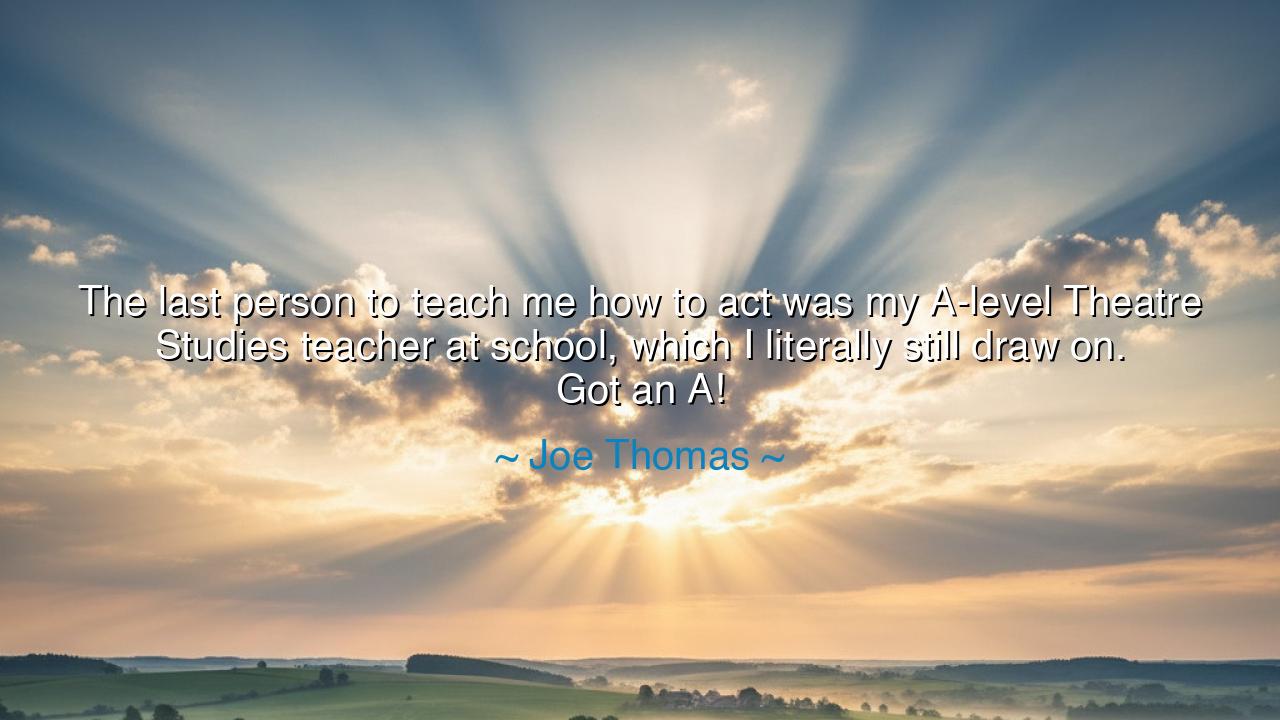
The last person to teach me how to act was my A-level Theatre
The last person to teach me how to act was my A-level Theatre Studies teacher at school, which I literally still draw on. Got an A!






Joe Thomas, in recalling his beginnings, once said: “The last person to teach me how to act was my A-level Theatre Studies teacher at school, which I literally still draw on. Got an A!” These words, humble yet radiant, reveal a truth that surpasses the boundaries of the stage: that the lessons of youth, imparted by the hands of teachers, often remain the deepest wells from which we draw throughout our lives. They remind us that greatness does not always spring from grand academies or famous mentors, but from the quiet labor of those who guide us when our talents are still tender and unformed.
The meaning of this reflection rests on the enduring power of teachers. Thomas does not attribute his craft to later workshops or celebrated directors, but to the early shaping of a schoolteacher whose guidance still lives within him. This shows us that foundations matter more than embellishments. The wisdom given at the right time, with sincerity and clarity, becomes a treasure a person carries across decades. In the case of Thomas, his acting career still leans upon the principles taught in those formative years.
The origin of this truth is ancient. Among the Greeks, young men who studied under masters like Aristotle or Plato carried those teachings into their lives as leaders, generals, or thinkers. Alexander the Great, though he conquered continents, confessed that he owed his understanding of the world to Aristotle, his teacher in youth. So too, Thomas honors his Theatre Studies teacher, acknowledging that the seeds sown in school became the roots of his art. This lineage of gratitude binds the actor of today to the sages of old.
History gives us examples of this invisible chain of influence. Consider William Shakespeare, who never attended university but whose schoolmasters introduced him to Latin, rhetoric, and the great authors of antiquity. Those lessons, absorbed in a modest grammar school, blossomed into the richest body of drama the world has ever seen. Or think of Helen Keller, who, though locked in silence and darkness, was given language and expression by the patience of Anne Sullivan. Without those early teachers, their genius might never have reached the world.
Thomas’s statement also carries within it a spark of humor — the delight in saying, “Got an A!” Yet even this reveals a deeper truth: that recognition, however small, can encourage the spirit to pursue greatness. For the praise of a teacher or the reward of success in school can ignite a confidence that lasts a lifetime. In the hands of a teacher, marks and grades are not mere numbers, but seeds of courage placed in the heart of the young.
The lesson for future generations is profound: never underestimate the power of early teaching. Whether you are a student, remember that the lessons you now receive may one day be the foundations of your craft, your art, your destiny. And if you are a teacher, know that your labor is not wasted; though you may not see the full fruits of your work, the lives you touch will carry your wisdom far beyond the walls of your classroom.
Practical action must follow. Students should carry gratitude toward their teachers, remembering the roots from which their skills and confidence sprang. Teachers must recognize the immense weight of their calling, for their words may echo across decades in ways they cannot yet imagine. And all of us should look back at our own beginnings, to honor those who guided us when we were yet unformed. For their influence, like the lessons of Thomas’s teacher, still flows silently within us.
Thus, Joe Thomas’s memory becomes a parable for all: that the teachers of youth are the true sculptors of destiny, and that their lessons, simple yet profound, outlast fame, fortune, and time. Cherish those early teachings, for they are the stones upon which you stand; and live with gratitude, knowing that no greatness is ever achieved alone, but always upon the foundation laid by others.






AAdministratorAdministrator
Welcome, honored guests. Please leave a comment, we will respond soon